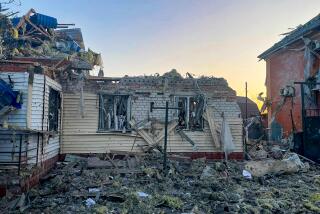Putin demands Kiev open ‘statehood’ talks with eastern Ukraine
- Share via
Russian President Vladimir Putin demanded Sunday that the Ukrainian government cease battling separatists in the country’s east and immediately begin negotiations on the breakaway region’s “statehood,” according to Russian news accounts of his remarks.
His spokesman, Dmitry Peskov, later clarified that Putin didn’t mean to imply that the eastern Ukrainian territory under separatist control would become part of Russia, but that its status within Ukraine had to be revised to give the Russian-speaking region the power to protect its rights and interests.
But Putin’s call upon the Kiev government to negotiate with the pro-Russia insurgents as equals corresponded with the apparent strategy he has followed since the violence began five months ago: Help the separatists take territory and force the Ukrainian government to grant the newly proclaimed Novorossiya region virtual independence to align with Russia instead of the West.
In an interview with state-run Channel One television, Putin denounced the Ukrainian military campaign to recover separatist-held territory in the eastern Donetsk and Luhansk regions that were seized in March and April, after Moscow annexed Ukraine’s Crimean peninsula on March 18. The Kremlin and the separatists have lately branded the seized territory “Novorossiya,” or “New Russia,” a term that harkens to pre-revolutionary glory days of the Russian empire.
Putin said that anyone who believed peace talks are in the offing as Ukrainian politicians launch campaigns for an Oct. 26 parliamentary election and while government troops are attacking civilian communities in separatist-held regions is “a prisoner to illusions,” Itar-Tass reported.
“We must immediately commence substantive talks and not only on technical issues, but also on the political organization of society and the statehood status of southeast Ukraine in order to serve the interests of people living there,” he said.
Peskov said Putin’s reference to statehood was meant in the context of the broader autonomy that has been discussed for months with the Kiev leadership as it struggles to allay fears in the Russian-speaking areas that their cultural and linguistic rights are in danger.
Only the Ukrainian government can grant the eastern regions the necessary autonomy, Peskov said.
It’s not a matter to be negotiated between Ukraine and Russia, Peskov said, “because it’s not a conflict between Russia and Ukraine, but an internal Ukrainian conflict.”
The Kremlin spokesman’s intercession to correct the “misinterpretation” of Putin’s remarks underscored the Russian leadership’s approach to dealing with the separatist rebellion in the east differently from its outright seizure of Crimea, where the majority of the 2 million population is ethnic Russian. Moscow would have a much more difficult fight to annex even the Donetsk and Luhansk regions of eastern Ukraine, as most of the 6.5 million residents are not Russian and pre-conflict polls showed broad support for staying within Ukraine.
The autonomy that Russian diplomats have discussed in international forums would grant regional governments in Ukraine the authority to determine their own trade agreements and foreign relations, effectively handing the Kremlin de facto control over territory that would link the Russian mainland with Crimea. The Black Sea peninsula annexed five months ago is home to Russia’s main naval fleet as well as commercial maritime facilities and historic coastal resorts.
The regions between Russia’s Rostov area and Crimea are also home to mines, factories and foundries that produce vital components for the Russian military.
Ukrainian President Petro Poroshenko proposed during his inauguration speech on June 7 that Ukrainian lawmakers – after new elections -- weigh constitutional amendments to give more control to the disparate regions over their finances and the status of languages. But his vision of autonomy appears to differ sharply from that of the Kremlin and the separatist rebels Moscow is accused of arming and instigating.
Putin’s latest call on Kiev to deal with the separatist leaders as equals followed new advances by the rebels last week after Russian troops and tanks entered eastern Ukraine from a previously peaceful area along the Sea of Azov. The Russian-backed separatists took control of the town of Novoazovsk in a drive that Ukrainian security officials say they fear is the opening of a campaign to seize the strategic coastal territory all the way to Crimea. That has spurred a massive civilian and military effort to fortify Mariupol, a steelmaking port of 500,000 that lies between Novoazovsk and the narrow gateway into the Crimean peninsula.
Poroshenko on Saturday addressed a meeting of European Union leaders in Brussels to urge action to prevent further Russian aggression against Ukraine, a former Soviet republic that has been independent for 23 years.
“We are close to the point of no return,” Poroshenko warned. “Thousands of foreign troops and hundreds of foreign tanks are now on the territory of Ukraine.”
The EU summit took no definitive action; the leaders called for drafting more punishing sanctions on Russia to be imposed in the event of an unspecified escalation of the Ukraine crisis.
Ukrainian soldiers had to withdraw from their positions in Ilovaysk after two columns of Russian armor and 1,000 troops last week moved into the Donetsk region to bolster the beleaguered separatists, Col. Andriy Lysenko, spokesman for the Ukrainian National Security and Defense Council, told reporters in Kiev on Saturday.
The first of a reported 63 Ukrainian soldiers who were trapped in Ilovaysk by the Russian incursion were swapped Sunday for 10 Russian paratroopers captured inside Ukrainian territory a week ago, Lysenko said Sunday.
Follow @cjwilliamslat for the latest international news 24/7
More to Read
Sign up for Essential California
The most important California stories and recommendations in your inbox every morning.
You may occasionally receive promotional content from the Los Angeles Times.










